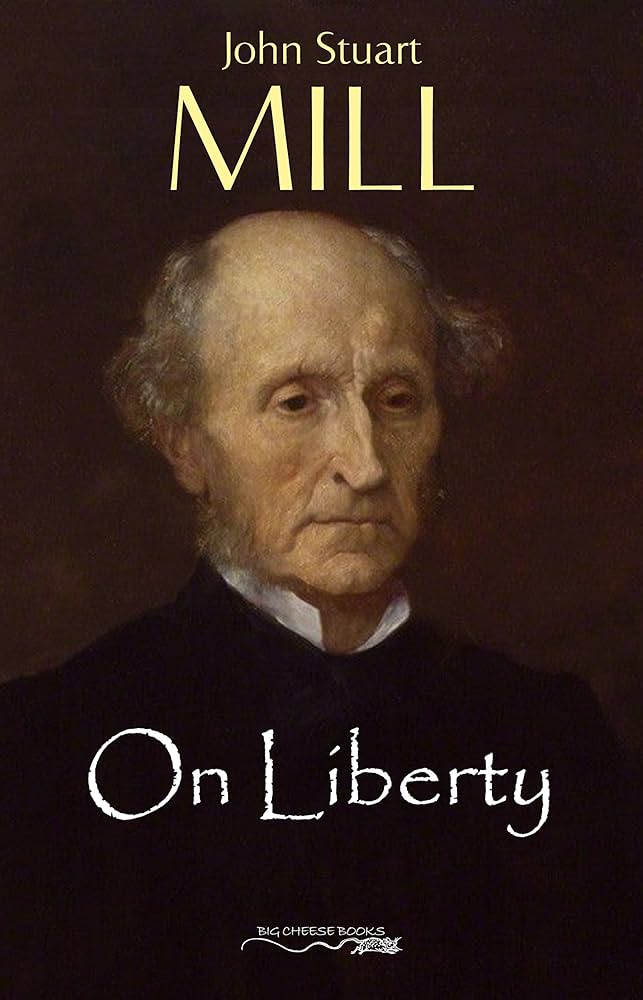Table of Contents
A Manifesto for Individual Freedom
Published in 1859, On Liberty by John Stuart Mill remains a foundational text in political philosophy and liberal thought. Written against the backdrop of Victorian England’s rigid moral codes and growing democratic structures, the work champions the absolute necessity of personal freedom—not only as a political right but as the very engine of human progress.
Mill’s enduring contribution is his razor-sharp distinction between self-regarding actions, which should be protected from interference, and other-regarding actions, which may be justifiably limited.
Core Themes: Liberty, Individuality, and the Limits of Power
The Harm Principle
Mill’s most famous doctrine—the harm principle—states that the only reason power can be rightfully exercised over an individual, against their will, is to prevent harm to others. This principle forms the moral bedrock of liberal democracies and resists both governmental tyranny and the more subtle threat of the tyranny of the majority.
This insight was radical in its time and remains fiercely debated in contemporary discussions on censorship, social norms, and public health mandates.
The Importance of Individuality
For Mill, liberty is not merely freedom from coercion, but the freedom to become fully oneself. He extols individuality as a key component of human flourishing, progress, and social vitality.
A society that stifles difference in the name of conformity, Mill warns, becomes intellectually stagnant and morally decayed. Diversity of lifestyles and opinions is not a threat—it is a sign of life.
Freedom of Thought and Expression
One of Mill’s most compelling arguments is for unfettered freedom of speech. He contends that:
- Silencing an opinion robs humanity of truth, even if the opinion is false.
- Even false ideas contribute to the sharpening of true ones.
- The collision of differing views is essential for intellectual and moral development.
In an era of social media censorship and polarized discourse, this section of On Liberty reads with renewed urgency.
Limits of Authority—Both State and Social
Mill distinguishes between legal coercion and social coercion, seeing both as potential enemies of liberty. Even when the state is just, social conformity can be a suffocating force.
He anticipates debates in modern political theory about soft power, cancel culture, and the fine line between public morality and private autonomy.
Influence and Legacy
On Liberty has been a cornerstone of liberal democratic thought for over 150 years. Its influence is seen in:
- Constitutional frameworks: The harm principle is echoed in First Amendment law and international human rights declarations.
- Political philosophy: Mill shaped subsequent liberal theorists, from Isaiah Berlin to John Rawls.
- Feminism and civil rights: Mill’s commitment to liberty laid groundwork for future struggles for gender and racial equality.
- Modern jurisprudence: His arguments continue to shape debates around legislation, civil liberties, and free speech.
Strengths and Limitations
Strengths:
- Clarity of prose and logical rigor make the arguments enduringly accessible.
- Balanced and nuanced—Mill acknowledges complexity without oversimplification.
- Ethical and political relevance—his ideas apply broadly across domains.
Limitations:
- Eurocentric and historically bounded—Mill occasionally assumes a particular cultural model of progress.
- Ambiguity in application—the “harm principle” is powerful but can be difficult to operationalize clearly in practice.
- Blind spots on power dynamics—though progressive for his time, Mill’s framework underplays systemic inequality.
Who Should Read It?
- Students of political philosophy or ethics
- Policy makers and civil rights advocates
- Those concerned with censorship, liberty, and democratic health
- Anyone seeking a clear, principled defense of individual freedom
TL;DR
On Liberty is as much a moral vision as a political treatise. It upholds liberty not as license, but as the necessary condition for humanity’s highest development. In an age of social conformity, echo chambers, and institutional overreach, Mill’s voice still speaks: eloquent, reasoned, and defiantly free.

Leave a Reply